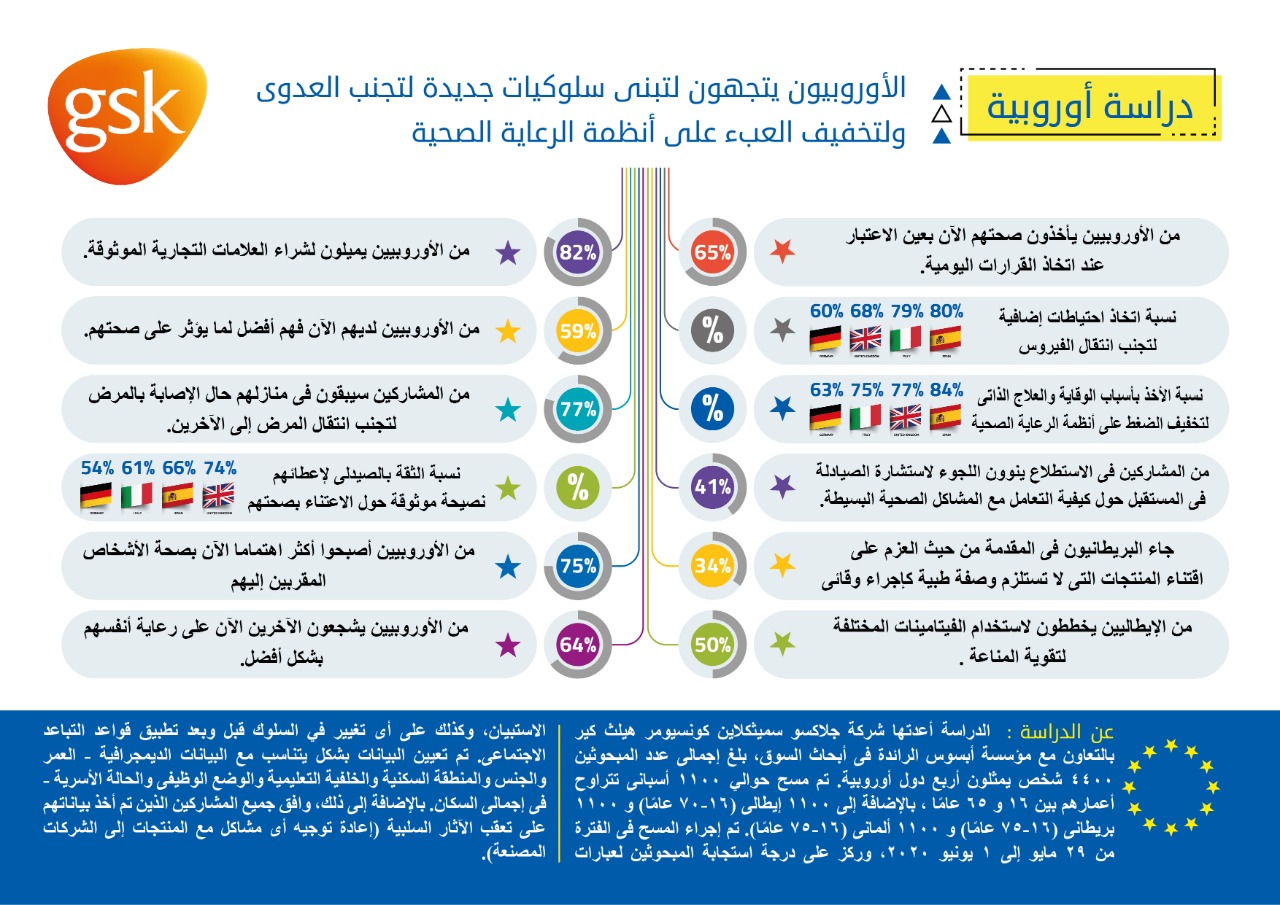
New research shared today by GSK Consumer Healthcare and IPSOS reveals that the COVID-19 pandemic has had a significant impact on people’s behaviour and attitudes to self-care. Key findings from the research, which surveyed 4,400 participants aged between 16 and 75 years in Germany, Italy, Spain and the UK, are below:
– The coronavirus pandemic has incited Europeans to adopt new everyday health habits: 65 % of people across the four countries are now more likely to consider their health in day-to-day decision-making
– A significant proportion of Europeans are now taking extra precautions to avoid illness-transmission: Spain 80 %, Italy 79 %, UK 68 %, Germany 60 %
– The vast majority of people consider it important to take their health into their own hands to relieve pressure on healthcare systems: Spain 84 %, UK 77 %, Italy 75 %, Germany 63 %
– Some 41 % of all people of all people across the four countries now plan to consult pharmacists more often for advice about how to treat minor health concerns
– Britons take the lead in intending to top up their medicine cabinet with over-the-counter products as a precautionary measure (34 %), and around half of Italians plan on using vitamin products and multivitamins to strengthen their immune system
– Buying trusted brands is important to people in all countries surveyed, as is buying products that are grounded in science; on average across all four countries, 82 % of respondents said that products they use must be scientifically proven
COVID-19 has taught the public to become more self-aware about self-care, prompting them to make positive changes to their day-to-day lives for the benefit of their health
The pandemic has caused people across Europe to pay closer attention to their health, symptoms of illness and to adopt new behaviours to minimise risk of transmission – such as more regular handwashing, which is widely recognised as one of the most effective ways to reduce the spread of the virus. In general, Europeans recognise that they took their health for granted prior to the COVID-19 outbreak, and many now plan to improve self-education around health issues. On average across all four countries, 59 % of people surveyed now have a better understanding of what impacts their health, and the majority of people are more likely to consider their health in day-to-day decision-making as a result of COVID-19: Spain 74 %, Italy 69 %, UK 62 %, Germany 54 %. When asked to consider their future behaviour, 77 % of Europeans would stay at home as much as possible when ill to avoid transmitting their illness to others. In order to strengthen their immune systems, around half of Italians plan on using vitamin products and multivitamins.
The COVID-19 pandemic has heightened Europeans’ appreciation for health services and frontline workers and people are keen to help relieve pressure on the healthcare system by consulting pharmacists more often or by turning over-the-counter medicines
The majority of people in all countries surveyed consider it important to take their health into their own hands in order not to burden the health system, particularly in Spain (84 %), with the UK at 77 %, Italy at 75 % and Germany at 63 %. In order to achieve this, the role of pharmacists is increasing in importance in the wake of the pandemic. For 36% of Europeans surveyed, their GP surgery, NHS walk-in centre, or A&E at their local hospital is the first place they would go to seek advice about healthcare issues such as joint/movement pain, headaches, skin rashes or colds and flu. However, some 41% of people across the four nationalities now intend to use a pharmacist more in the future to give them advice about such concerns.
A significant 74 % of Britons would trust a pharmacist to give them reliable advice to help them manage their health, and 66 % of Spaniards, 61 % of Italians and 54 % of Germans agree with this statement.
Consumers are turning to trusted brands, with a strong heritage, that are grounded in science
Britons take the lead in intending to top up their medicine cabinet with over-the-counter products, with over one third intending to do so as a precautionary measure. When choosing over-the-counter products, trusted brands are important to the majority of Europeans (81 % in total): 79 % of Britons, 84 % of Spaniards, 73 % of Germans and 89 % of Italians, as are brands with a strong heritage. Buying products that are grounded in science is important to the vast majority of people in all countries – 89 % of Italians, 86 % of Spaniards, 81 % of Britons, 73% of Germans.
COVID and Compassion: Amidst social distancing measures, people are recognising the benefit of responsible self-care to loved ones and communities at large
Respondents to the survey indicated that they are now more likely to be concerned about the health of others, and to encourage those around them to practise responsible self-care. This is of particular concern to Spaniards and Italians. On average, three quarters (75 %) of Europeans are now more concerned about the health of people close to them: Spain 82 %, Italy 77 %, UK 75 % and Germany 66 %. 64% of Europeans would now encourage others to take better care of themselves; 74 % in Spain, which compares to 70 % in Italy, 65 % in the UK and 48 % in Germany.
Filippo Lanzi, Regional Head, EMEA GSK Consumer Healthcare, said, “As the defining global health event of recent history, the Covid-19 pandemic has had a profound impact on the lives of people living in Europe and beyond. Our research shows the extent to which the pandemic has impacted attitudes towards personal wellbeing and self-care, and it’s encouraging to see the increased importance that many people are now placing on looking after their own and others’ health.
“At GSK Consumer Healthcare, we’re well-placed to help redefine the role of self-care in people’s lives through responsible education and scientifically-backed brands – and we believe this holds a long-term benefit for both individuals and society as a whole.”
